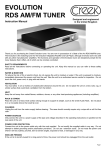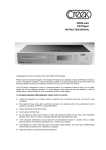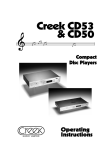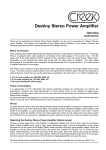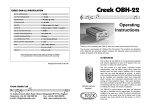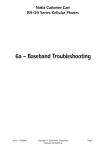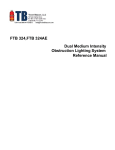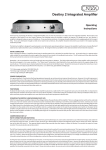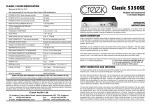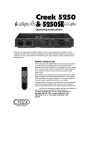Download User Manual - Creek Audio
Transcript
EVOLUTION 100A Integrated Amplifier Instruction Manual Rev 1.1 Thank you for purchasing a Creek Audio EVOLUTION 100A Integrated Amplifier. You are now in possession of a State of the Art performance product. The functions and operation of this integrated amplifier are simple, however, the following notes are provided to explain all aspects of its design and use. For simplicity we will now refer to the amplifier as the ‘100A’. Although this User Manual is intended to provide the latest instructions for use, it is possible that a later version may be available to download from the Creek website. Please check at www.creekaudio.com Go to the EVOLUTION 100A product page and click on the tab marked Instructions. UNPACKING AND LOCATING THE AMPLIFIER When unpacking the EVOLUTION 100A please keep all the packing material in a safe place for possible future use. In the carton there is a separate mains cable suitable for connecting to the mains supply in the country of use. You will also find a remote control unit and batteries. Make sure that the EVOLUTION 100A is on a suitable table, shelf or hi-fi equipment cabinet. It is important to allow good ventilation to the heat-sinks inside the case. Avoid obstruction of the ventilation slots on the top and bottom of the EVOLUTION 100A. It may be necessary to place the EVOLUTION 100A on the top of other equipment, or a separate shelf to allow for this. Do not place it at the bottom of a stack of equipment, as it may get too hot and switchoff, with an over-temperature warning on the display. MAINS CONNECTION IMPORTANT: Please check that the voltage selector switch on the bottom of the amplifier is set to the correct supply voltage for your region. Permanent damage can be caused by using an incorrect setting. The IEC socket end of the supplied cable should be firmly inserted into the connector on the rear panel. Connect the mains plug to your AC outlet. Do not overload the mains outlet with too many plugs or adaptors. The high quality performance of the 100A may be impaired if the electrical supply to it is in poor condition. If in doubt, consult your hi-fi dealer, or a qualified electrician for advice. The Mains Input connector on the rear panel is also fitted with a fuse in a pull-out drawer. The value of the 5 x 20mm cartridge fuse is clearly stated (T8AL 250V) next to the socket, on the rear panel. This means it is a 8 Amp Time-lag (Anti-surge) type fuse, rated at 250V. Always replace the fuse with one of identical rating to prevent the risk of fire! Page: 1 INPUT AND OUTPUT CONNECTIONS On the rear panel there are 5 Line level* inputs labelled 1-5. Inputs 3 and 4 can be configured for different requirements and these options are described below. Input configuration is controlled by a special menu which is available only during power-up, please see the section below. *Line level refers to a standardised way of transferring audio signals between equipment. It is typically characterised by a voltage level of between 300mV and 2Vr.m.s. The 100A will accept levels between 0 to 5.4V RMS and should therefore be compatible with all sources. Line 1 is suitable for any line level source, such as CD, Tuner, Tape, etc. Line 1 can also be configured for MM/MC Phono input. To configure for Phono input, an optional Creek Sequel 40/48/54 mk2 pre-amp should be fitted inside. See separate section below. Line 2 is suitable for any line level source, such as CD, tuner, Tape, etc. Line 3 is suitable for any line level source, such as CD, tuner, Tape, etc. Alternatively, Line 3 can be configured as AV Direct. This means the input passes the signal directly to the 100A’s power amp, bypassing the internal pre-amp and volume control. AV Direct allows a multi-channel AV system to be integrated into your high quality 2-channel hi-fi system with ease. Simply connect the Line 3 input to your AV amplifier’s Front L/R pre-amplifier output connections. The AV receiver must control the volume. AV Direct makes it possible to “Slave” the amplifier to another 100A using the pre-out connection, thus producing a bi-amplified system. AV Direct also is the best choice for operating the 100A with the Creek EVOLUTION 50CD, DAC or Pre-amp, when its output is configured with digital volume control. Line 4 is similar to Line 3, but offers either XLR or RCA input connectors. Do not use both connection methods simultaneously. *Balanced connections use a differential or symmetrical technique that is more resistant to external noise and interference. It is ideal for preserving signal fidelity and low noise over longer cable runs. Page: 2 Line 5 is suitable for any line level source, such as CD, tuner, Tape, etc. Line 5 is mounted on a removable expansion port that allows for two optional upgrade paths: In place of Line 5, it is possible to fit an AMBIT Tuner, or RUBY DAC, which can be installed by your dealer. Pre-out is an output signal that duplicates the signal to the 100A’s internal power amplifier section. It is affected by all the controls of the amplifier such as volume, tone, etc. and allows the user to drive another power amp if required. This can be used to “bi-amp” a suitably equipped pair of loudspeakers or to connect an active sub-woofer for example. CONFIGURING THE INPUTS To access the input configuration menu the product must be switched off. Hold down the MENU key whilst turning on the power and release once you see the “Setup Menu” appear. Here you will see the options for input configuration and restoring factory defaults. The tree looks like this: Line 3 Options – Line Level Input Power Amp Input Default setting. The input is conventional. Line 4 Options – Line Level Input Power Amp Input Default setting. The input is conventional. Factory Defaults Restores all settings to original factory states. This bypasses the internal pre-amp giving “AV Direct” mode. This bypasses the internal pre-amp giving “Line 4 Direct” mode. Navigate using the left-hand rotary control; pressing the control selects the option. Once configured press the MENU key again and the product will start up with the new settings. Headphone Output Headphones can be used via the front panel Jack socket. It can be used alone or together with loudspeakers. Go to MENU and make the selection via the Headphone switch option. When headphones are plugged in, a headphone symbol will show on the bottom left hand corner of the OLED screen. Page: 3 ADDING THE INTERNAL PHONO STAGE OPTION For added flexibility, the Line 1 input on the EVOLUTION 100A can be used either for vinyl disc (Phono) or line level. To listen to vinyl discs through the EVOLUTION 100A, it is necessary to fit the optional Creek plug-in – ‘Sequel Phono’ board. Check with your dealer for which version (MM40, MM 48 or MC54) suits your cartridge. When the Phono PCB is fitted, it will automatically indicate Phono on the display, when selected. Alternatively, Creek Audio also produces a range of separate high-grade Phono pre-amplifiers, which can be connected to any input. A GROUND terminal post is provided on the rear panel to connect your turntables ground wire if provided. LOUDSPEAKER CONNECTIONS The loudspeakers should be connected using a suitable pair of cables designed specifically for audio use. Check with your dealer for advice. The 100A’s high grade speaker terminals allow for bare wire, 4mm plugs or spade lug connectors. Tighten the terminal fully after fitting the loudspeaker wire. Please consult your dealer for advice if you are unsure. It is very important to connect the loudspeakers with the correct phase. Cables are normally polarised with a line or writing on the positive side to assist in this. Connect the red (or ‘positive’ or ‘+’) terminal of your loudspeaker to the red terminal of the amplifier and likewise for the black. If both channels are not connected with the same polarity, a severe loss of bass performance and lack of stereo image will result. It is very important not to short-circuit the loudspeaker cables together when the 100A is powered-on, as permanent damage may result. Ensure there are no strands of cable bridging the terminals when connecting the loudspeakers and make all connections with the 100A turned off. If it is necessary to change or move the location of the loudspeakers, make sure that you first turn-off the 100A and then re-check the wiring once finished. Speakers A and B The 100A is capable of connecting two pairs of speakers and controlling them with the front panel menu or remote handset. To select speakers A, B, A+B, or no speakers, press the menu button on the front panel and scroll down to Speaker Selection. Press the left hand input selector to bring-up the options. Rotate the left hand knob to choose the option you require. The display will revert to normal after a few seconds. This can also be done with the two blue buttons on the remote marked Speakers A and B. REMOTE IN/OUT All EVOLUTION 50/100 products are equipped with remote control input and output jacks to allow the use of external infra-red (IR) sensors . Check with your dealer for more info. Page: 4 OPERATING THE EVOLUTION 50A The front panel controls, from left to right, feature a rotary Input selector knob, a group of 4 buttons marked SRC, PRE, TUNE, and BAND for the tuner, if fitted. Next is the OLED display window, then 4 more buttons marked TONE, MENU, BAL and INFO. The volume control, headphone socket and Power on/off switch complete the line-up. NOTE: All control settings are memorised, even after the power is turned off. Turn on the power using the push-button on the right-hand side of the product. The display will show the Creek logo whilst the internal electronics are configured and allowed to settle. The amplifier is ready for use once the display changes to show selected input and volume settings. The input is selected by the left-hand rotary control: rotate the control until the desired input is shown in the display. The inputs can also be chosen using the remote control. The volume can be adjusted via right-hand rotary control on the front panel or remotely with the EVO remote handset. Pressing the volume knob will mute the signal; pressing or turning the knob clock-wise will un-mute the signal. If the volume is adjusted between -9dB to 0dB and then muted, the level will be reduced to -10dB when un-muted. The maximum attenuation from the electronic volume control is -80dB. If the volume knob is turned below this level it will mute the output. It is important to note that the power output of the amplifier is the product of both the volume setting AND the input signal level from the source equipment. Sources with a lower output signal will require a higher volume setting to reach the same loudness. Do not be worried if you find the volume is approaching 0dBs to achieve the required listening level, it does not necessarily mean the amplifier is working harder or delivering its full capability. The current volume setting is stored during power off but when the 100A is turned back on, the value will be limited to a maximum level of -20dB, to prevent unexpected loud sounds from being produced. The MENU button offers some set-up options to tailor the operation of the 100A to your preference. Pressing this button will reveal 3 options which can be highlighted using the lefthand rotary control. Depressing the rotary control will select the highlighted option to reveal further options. The options tree looks as follows: Page: 5 Display Settings Always OnThe OLED display will be lit at all times the product is operating Auto OffThe OLED display will go out after a short delay Display Brightness FullMaximum screen brightness Medium LowLowest screen brightness Headphone Switch Disable Speakers Simultaneous Use Inserting a headphone jack will mute the loudspeaker outputs Both loudspeakers and headphones will be active simultaneously Configure the product to your taste by selecting the desired options with a press of the lefthand rotary control. Use the MENU key to exit. The BAL (Balance) button allows adjustment of the relative levels of left and right channels. This is used to compensate for non-ideal loudspeaker placement or to isolate one channel of the audio signal. Once the BAL button has been pressed, the right-hand rotary control adjusts the balance and the relative level difference is shown on the display. To quickly reset the balance to Centre simply press BAL and then press the volume control before the display changes back to normal. The characteristic of the control has been tailored to maintain the same perceived volume level from the system in order to allow easy adjustment. The TONE button allows relative Bass and Treble levels to be adjusted if required. To maintain optimum sound quality, the tone control circuits are normally bypassed; to activate them simply press and hold the TONE button until the display indicates “Tone On”. Pressing the TONE button now cycles through Bass, Treble and Volume options. Adjust tone with the right-hand knob and to reset the value to zero quickly, press TONE and then Volume before the display reverts to normal. To completely disable the tone circuits, press and hold the TONE button until the screen indicates “Tone Off”. Tone settings are remembered even when the controls are bypassed. HEADPHONES The 100A uses a dedicated headphone amplifier to provide a low impedance output signal to the jack socket on the front panel. This is supplied by the pre-amp and therefore, if you select AV Direct for Line input 3 or 4, the signal will bypass the pre-amp and pass directly through to the power amp, so no signal will be available to the headphones. PROTECTION The 100A has short circuit (over-current), over-temperature and DC offset protection. The internal loudspeaker relays will isolate the output under any of these conditions to avoid potential damage to the speakers and the display will indicate the cause. Page: 6 The loudspeakers will be re-connected after a short delay and only if the fault has been cleared. Over temperature If the 100A has over-heated, it may indicate the top of the case is not properly ventilated. If so, make sure the amplifier is not located inside a cupboard or placed under other equipment. It may also mean the amplifier has been driving low impedance loudspeakers at a high level for a long period, gradually causing the temperature to rise. The temperature of the internal heatsink is monitored by a sensor and can be checked in a start-up INFO. Press INFO and then power the amplifier on. The display will show the heatsink temperature in centigrade only. Over current If there has been a short circuit of the loudspeaker wiring, the 100A will immediately disconnect the output. To clear the fault, switch off the amplifier and check the speaker wiring for shorts. Alternatively, the loudspeaker you are trying to drive may be unsuitable due to being too insensitive or having very low impedance. The EVO 100A is capable of driving a 2 ohm load to clipping, before the over current protection is engaged. DC offset If the ‘DC presence’ warning is displayed, it may be due to an internal fault with the amplifier or could be triggered by severe clipping (overload) of the amplifier. The output is disconnected to avoid potential damage to loudspeakers. If the condition clears by itself, try reducing the volume setting. Never drive your amplifier to levels which cause audible distortion. This is an indication that either the amplifier or loudspeakers are being pushed beyond their capabilities and may result in permanent damage. POWER CONSUMPTION It is appreciated by Hi-Fi enthusiasts that leaving equipment powered up continuously can improve the performance. However, this small improvement in sound quality comes at the expense of continuous power consumption from the mains, which will increase your electricity bill and also reduced working life of the product. The 100A draws approximately 20 Watts of power when switched on and not producing a signal. We recommend switching the 100A off at the front panel if it’s not going to be used for a prolonged period of time. Normal performance is achieved in a very short period of time due to the advanced circuitry in the 100A amplifier. Relay switches are used to route signals inside the 100A and these produce a mechanical click sound when they operate; this is normal and does not indicate a malfunction with the product. Page: 7 REMOTE CONTROL The 100A’s remote control handset allows the user to operate the amp and CD/DAC/Pre and tuner functions. It should be noted that the EVO remote handset will only operate Creek’s EVOLUTION 50 and 100 ranges of products and is not able to switch the mains power on or off. The operation of the remote is designed to be intuitive. However, to select Amp, CD, tuner and DAC functions it is necessary to press the appropriate button at the top of the remote first. FIRMWARE It is possible to check the firmware status of your 100A on its display. Turn off the amp and hold down the INFO button, then power-up the 100A. Once the screen has finished displaying the Creek logo it will switch to “About this unit”. The firmware version will be displayed along with the temperature of the internal heatsink. RADIO INTERFERENCE The EVOLUTION 100A is designed to work properly in normal domestic operating conditions. However, its performance could be affected if sited near to a radio transmitter such as a mobile phone, etc. Relocating the 100A or the radio transmitter will normalise the situation. Page: 8 FINAL WORDS The EVOLUTION 100A is designed to provide years of reliable use. If you need more assistance, it is always advisable to go back to the supplying dealer for their expert help. If you are unfortunate enough to need service work to be carried out on your 100A, it should be returned to your dealer in the original packing material if possible. Creek Audio Ltd reserves the right to change or modify the specification of its products without prior warning. WARRANTY If within two years of date of purchase, your EVOLUTION 100A proves to be defective for any reason other than accident, misuse, neglect, unauthorized modification, or fair wear and tear, Creek Audio Ltd. will, at its discretion, replace the faulty parts without charge for labour or return carriage within the United Kingdom. This warranty is valid only in the United Kingdom only and given in addition to statutory rights. Service enquiries outside the United Kingdom should be addressed to the supplying dealer first or the Creek distributor/importer. For list of distributors, please visit: www.creekaudio.com/distributors/ Warranties granted in these countries are entirely at the discretion of the distributor. Page: 9 Technical Specifications: Power output @ 1% THD >110 Watts into 8 Ohms, both channels driven Power output @ 1% THD >170 Watts into 4 Ohms, both channels driven Continuous output current >8.5A (sine wave) Peak output current, burst into 0.5 Ohms +/-26 Amps, current burst into 0.5 Ohms THD and Noise, 2/3 rated power 8 Ohms <0.002% 20 Hz to 20 kHz Signal to Noise Ratio 102dBA Line input Frequency Response <10Hz to >100 kHz +/-2dB Gain at 1 kHz Un-balanced 33.3dB (x 48) Gain at 1 kHz Balanced 27.0dB (x 22.5) Input sensitivity, Line level 810mV Maximum input voltage, RCA and Balanced (XLR) 5.4V and 10.8V r.m.s. Crosstalk -80dB at 1 kHz DC offset < +/-10mV Pre-Amp Inputs 5 x RCA un-balanced, including optional Plug-in Phono options Input 1 changes to Phono with Sequel Phono fitted. Gain: 40, 48 or 54dB Power amp inputs Inputs 3 & 4 can be assigned as Power Amp direct inputs Tuner option AMBIT Tuner module (optional extra) DAC optionRUBY DAC module (optional extra) IR BUS For adding an external IR sensor or linking to an other product. Loudspeaker Outputs A+B x2 pairs of high-grade 4mm binding posts Headphone Output x1 x 6.3mm jack socket with dedicated low imped ance headphone amp (<50 Ohms) Output impedance <0.05 Ohms 20Hz to 20 KHz Mains voltage 230/115V 50/60Hz, switchable Front panel finish options Silver or Black Power Consumption: Idle, Max, Standby <20 Watts, 600 Watt, No standby Weight net 9kgs (20 lbs) Size W/H/D inc. feet and knobs 430 x 60 x 280mm (17 x 2.3 x 11”) Page: 10 Creek Audio Ltd 12 Avebury Court, Mark Road, Hemel Hempstead, Hertfordshire, HP2 7TA England www.creekaudio.com - [email protected] - +44(0)1442 260146













